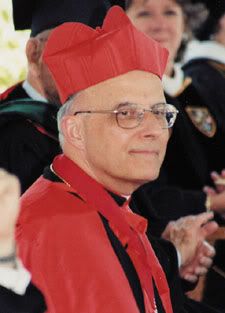
From the weekly column of Francis Cardinal George, Archbishop of Chicago:
A few months ago, the current Bishop of Rome and successor of St. Peter, Pope Benedict XVI, offered an interpretation of the Second Vatican Council that merits close attention. The Council was called in order to give genuinely new impetus to the Church’s mission in the world. In order to overcome within the Church anything that might impede or obscure the Church’s mission, the Council called for an updating or renewal in the Church’s life. “Aggiornamento,” which is Italian for updating, was not, however, intended to mean that the Church should simply accommodate herself to the world. Ecclesiastical renewal is not a form of self-secularization. Pope Benedict says of those who took this path: “They have underestimated the inner tensions as well as the contradictions of the modern epoch.”
Pope Benedict contrasted two interpretations of the Council. One is a story of discontinuity and rupture with the Church’s past. It is as if the Church after the Council was a new, a different Church from all that had gone before. Where the texts of the Council did not support this interpretation, they were put aside in the name of the “spirit” of the Council. This is not to deny that a “spirit” of a meeting is always more than the texts it produces; it is to say that the Church’s development from one age to the next cannot be in contradiction with her apostolic origins. Among those arguing for rupture, some Americans found attractive the idea that a Council can reconstitute the Church with a mandate from the “people,” understood as separate from their pastors. But the essential structures of the Church come from Christ, and the bishops of Vatican II had no mandate from Christ to make a new Church or destroy the nature of their own apostolic office. The more authentic interpretation of Vatican II, according to our Holy Father, sees the renewal or reform rooted in the tradition that links the Church to her apostolic origins.
You can read the whole thing here. If you say to our Roman brethren, "The Lord be with you," they will soon be responding,
"And with your spirit."
I suppose its always works this way, but I noticed that the United States Conference of Catholic Bishops will be meeting in Los Angeles at the same time as the General Convention of the Episcopal Church. The top order of business begins with the Bishops' Committee for the Liturgy (BCL) considering proposed amendments to the new translation of the Order of Mass. The final final debate and vote on the English translation ("the Grey Book") of the editio typica tertia of the Missale Romanum will take place on Thursday.
A number of free translations will be brought back into conformity with the Latin original, in response to directives from the Vatican Congregation for Divine Worship. Some of the highlights are: returning the response "et cum spiritu tuo" to "And with your spirit," the new translation of the Gloria, the return to the Latinates "I believe" and "consubstantial" in the Nicene Creed, corrections to the translations of the Sanctus ("Holy is the Lord God of Hosts"), and a more accurate and beautiful translation of the Roman Canon (except for the horrible mistranslation of pro multis in the institution narrative as "for all").


No comments:
Post a Comment